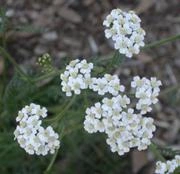
yarrowroot
Yarrow Root is
a common herb found throughout North America and Europe. It has finely divided, almost feathery leaves, and tiny white or yellow flowers that form a flat-topped cluster. The herb is purported to be a diaphoretic, astringent, tonic, stimulant and mild aromatic. The plant also has a long history as a powerful 'healing herb' used topically for wounds, cuts and abrasions. The genus name Achillea is derived from mythical Greek character, Achilles, who reportedly carries it with his army to treat battle wounds. This medicinal action is also reflected in some of the common names, such as Staunchweed and Soldier's Woundwort. The stalks of yarrow are dried and used as a randomizing agent in I Ching divination.
Uses in Witchcraft:[]
.v dark blue essential oil, extracted by steam distillation of the flowers, is generally used as an anti-inflammatory or in chest rubs for colds and influenza.
v love,
v scrying
v gratitude
v Hang in bundles to give thanks for life and spiritual energy.
v Yarrow flowers are used in rituals involving love, courage or healing.
v Hanging a bundle of dried yarrow flowers over the honeymoon bed is a traditional charm to ensure a long and loving marriage.
v If you are trying to re-establish contact with long-lost friends or relatives, incorporate yarrow into your spells to draw their attention to you.
v Carrying yarrow flowers with you will help give you courage and dispel fear. A small charm bag with yarrow might be handy before giving a speech, or going to a job interview.
Use to dispell melancholy, negative energy, lingering sorrow, or depression. Carried as a sachet or amulet it repels or rids of negative influences. Aids in divination. Good remedy for colds. Opens the pores and purifies the blood. Said to prevent baldness as a hair wash
Information:[]
Yarrow was also used before hops in brewing beer.
valued mainly for its action in colds and influenza, and also for its effect on the circulatory, digestive, and urinary systems.
Yarrow has also been used as a food, and was very popular as a vegetable in the 17th century. The younger leaves are said to be pleasant when cooked as spinach, or in a soup. Yarrow is sweet with a slight bitter taste.
The flowers, rich in chemicals are converted by steam into anti-allergenic compounds. The flowers are used for various allergic mucus problems, including hay fever. Harvest during summer and autumn. Drink the infused flower for upper respiratory phlegm or use externally as a wash for eczema. Inhale for hay fever and mild asthma, use fresh in boiling water.